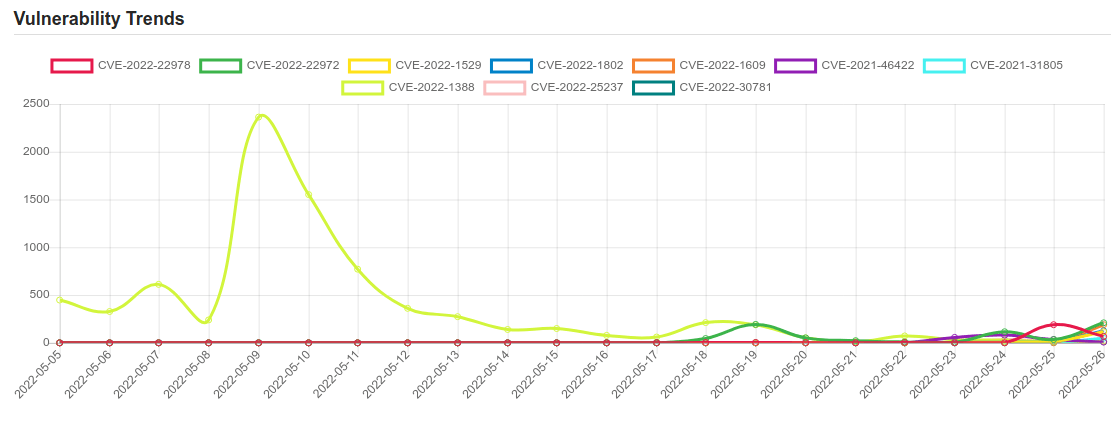Daily Vulnerability Trends: Fri May 27 2022

| CVE NAME | CVE Description |
| CVE-2022-23648 | containerd is a container runtime available as a daemon for Linux and Windows. A bug was found in containerd prior to versions 1.6.1, 1.5.10, and 1.14.12 where containers launched through containerd’s CRI implementation on Linux with a specially-crafted image configuration could gain access to read-only copies of arbitrary files and directories on the host. This may bypass any policy-based enforcement on container setup (including a Kubernetes Pod Security Policy) and expose potentially sensitive information. Kubernetes and crictl can both be configured to use containerd’s CRI implementation. This bug has been fixed in containerd 1.6.1, 1.5.10, and 1.4.12. Users should update to these versions to resolve the issue. |
| CVE-2022-29248 | Guzzle is a PHP HTTP client. Guzzle prior to versions 6.5.6 and 7.4.3 contains a vulnerability with the cookie middleware. The vulnerability is that it is not checked if the cookie domain equals the domain of the server which sets the cookie via the Set-Cookie header, allowing a malicious server to set cookies for unrelated domains. The cookie middleware is disabled by default, so most library consumers will not be affected by this issue. Only those who manually add the cookie middleware to the handler stack or construct the client with [‘cookies’ => true] are affected. Moreover, those who do not use the same Guzzle client to call multiple domains and have disabled redirect forwarding are not affected by this vulnerability. Guzzle versions 6.5.6 and 7.4.3 contain a patch for this issue. As a workaround, turn off the cookie middleware. |
| CVE-2022-22784 | The Zoom Client for Meetings (for Android, iOS, Linux, MacOS, and Windows) before version 5.10.0 failed to properly parse XML stanzas in XMPP messages. This can allow a malicious user to break out of the current XMPP message context and create a new message context to have the receiving users client perform a variety of actions.This issue could be used in a more sophisticated attack to forge XMPP messages from the server. |
| CVE-2017-11882 | Microsoft Office 2007 Service Pack 3, Microsoft Office 2010 Service Pack 2, Microsoft Office 2013 Service Pack 1, and Microsoft Office 2016 allow an attacker to run arbitrary code in the context of the current user by failing to properly handle objects in memory, aka “Microsoft Office Memory Corruption Vulnerability”. This CVE ID is unique from CVE-2017-11884. |
| CVE-2022-22787 | The Zoom Client for Meetings (for Android, iOS, Linux, macOS, and Windows) before version 5.10.0 fails to properly validate the hostname during a server switch request. This issue could be used in a more sophisticated attack to trick an unsuspecting users client to connect to a malicious server when attempting to use Zoom services. |
| CVE-2022-0540 | A vulnerability in Jira Seraph allows a remote, unauthenticated attacker to bypass authentication by sending a specially crafted HTTP request. This affects Atlassian Jira Server and Data Center versions before 8.13.18, versions 8.14.0 and later before 8.20.6, and versions 8.21.0 and later before 8.22.0. This also affects Atlassian Jira Service Management Server and Data Center versions before 4.13.18, versions 4.14.0 and later before 4.20.6, and versions 4.21.0 and later before 4.22.0. |
| CVE-2022-24706 | In Apache CouchDB prior to 3.2.2, an attacker can access an improperly secured default installation without authenticating and gain admin privileges. The CouchDB documentation has always made recommendations for properly securing an installation, including recommending using a firewall in front of all CouchDB installations. |
| CVE-2022-23270 | Point-to-Point Tunneling Protocol Remote Code Execution Vulnerability. This CVE ID is unique from CVE-2022-21972. |
| CVE-2022-26937 | Windows Network File System Remote Code Execution Vulnerability. |
| CVE-2022-1853 | No description provided |
| CVE-2022-22978 | In Spring Security versions 5.5.6 and 5.5.7 and older unsupported versions, RegexRequestMatcher can easily be misconfigured to be bypassed on some servlet containers. Applications using RegexRequestMatcher with `.` in the regular expression are possibly vulnerable to an authorization bypass. |
| CVE-2022-22972 | VMware Workspace ONE Access, Identity Manager and vRealize Automation contain an authentication bypass vulnerability affecting local domain users. A malicious actor with network access to the UI may be able to obtain administrative access without the need to authenticate. |
| CVE-2022-1609 | No description provided |
| CVE-2021-46422 | Telesquare SDT-CW3B1 1.1.0 is affected by an OS command injection vulnerability that allows a remote attacker to execute OS commands without any authentication. |
| CVE-2021-31805 | The fix issued for CVE-2020-17530 was incomplete. So from Apache Struts 2.0.0 to 2.5.29, still some of the tag’s attributes could perform a double evaluation if a developer applied forced OGNL evaluation by using the %{…} syntax. Using forced OGNL evaluation on untrusted user input can lead to a Remote Code Execution and security degradation. |
| CVE-2022-1388 | On F5 BIG-IP 16.1.x versions prior to 16.1.2.2, 15.1.x versions prior to 15.1.5.1, 14.1.x versions prior to 14.1.4.6, 13.1.x versions prior to 13.1.5, and all 12.1.x and 11.6.x versions, undisclosed requests may bypass iControl REST authentication. Note: Software versions which have reached End of Technical Support (EoTS) are not evaluated |
| CVE-2022-25237 | No description provided |
| CVE-2022-30781 | Gitea before 1.16.7 does not escape git fetch remote. |
| CVE-2022-1529 | Mozilla Firefox, Firefox ESR, Firefox for Android and Thunderbird code execution | CVE-2022-1529 |
| CVE-2022-1802 | Mozilla Firefox, Firefox ESR, Firefox for Android and Thunderbird code execution | CVE-2022-1802 |
If you like the site, please consider joining the telegram channel and supporting us on Patreon using the button below.


